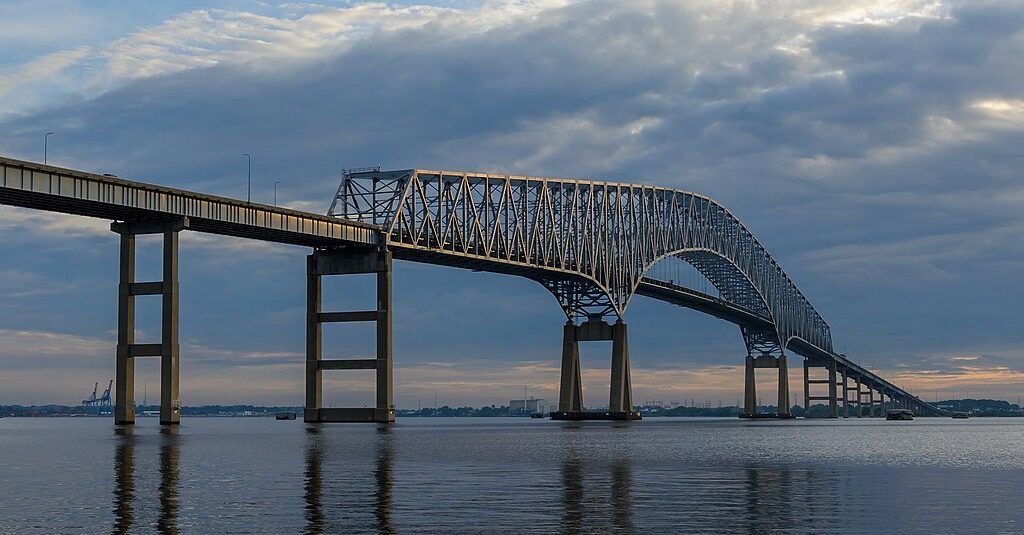American media outlets and transportation officials are scrambling to explain the cascading failures that caused the collapse of a key Baltimore bridge. What if we treated our national epidemic of car crashes with that same degree of urgency — not to mention that same holistic approach to saving lives?
That's the question that's been at the top of my mind since the Dali struck the Francis Scott Key Bridge early on Tuesday, prompting emergency visits from the President, the Secretary of Transportation, and the National Transportation Safety Board, as well as a wave of public debate about the many factors that might have precipitated the crash. Quickly, media outlets launched pointed investigations into outdated safety codes not designed for super-sized ships, the absence of buffers around the bridge's support columns, the mysterious reasons why the ship lost its propulsion, and even how simple tugboats might have prevented the tragedy, to name only a few.
Some pundits even scrutinized the general state of disrepair into which so much U.S. infrastructure has fallen, even if this specific infrastructure was rated "fair" at its last inspection. (As a side note: that this massive piece of infrastructure was not one of the America's many perennial "crumbling roads and bridges" is, frankly, a miracle, especially in an age when state Departments of Transportation often prioritize highway expansion over repair — even if maintenance alone was not enough to stop this particular catastrophe. That the six people presumed dead following the collapse all belonged to a work crew which was actively patching potholes at the time of the crash is an especially tragic irony, and a horrific failure of a safety effort that otherwise saved many lives.)
Here's video of the collapse of the Francis Key Scott Bridge from this morning. The bridge was struck by a cargo ship just before 1:30 a.m. A search is underway for at least seven people. pic.twitter.com/FRGHeJ1gIe
— The Baltimore Banner (@BaltimoreBanner) March 26, 2024
Needless to say, it is hard to imagine anywhere near this scale of a national response following a car crash, even if it claimed just as many lives.
For instance: when two likely drag-racing drivers killed six other road workers on another stretch of I-695, the governor of Maryland did not immediately declare a state of emergency as the community absorbed that staggering loss. And federal DOT Secretary Pete Buttigieg certainly did not issue an emergency mandate to automakers to install speed limiters on all their cars in response to the tragedy, despite the fact that both drivers were traveling north of 120 miles per hour on impact. No media outlet I could find even mentioned the existence of that life-saving technology — never mind suggested that its absence was among the most obvious structural reasons why six people could so rapidly be slaughtered.
People across America, though, now know exactly what a concrete "dolphin" is, and many have strong opinions about whether or not the Key Bridge had enough of them.
We design modern bridges for ship impact, but this was not always the case.
— Matt Dursh (@MattDursh) March 26, 2024
In 1980 the Sunshine Skyway Bridge also collapsed from vessel strike.
The photo below is the original Skyway. Similar bridges and identical failure.
The Skyway collapse changed bridge design.
2/x pic.twitter.com/oEmJywVQab
Or course, it's a great thing that our collective response to the Key Bridge tragedy is prompting average people to become armchair experts on maritime law and bridge engineering, rather than shrugging off a preventable crash.
I'll even concede that it makes sense that a major bridge collapse, much like a major plane crash, would draw far more scrutiny than a single car crash ever would. A single automobile collision doesn't typically cut off a major port, snarl global supply chains, and congest adjacent roads (though car traffic usually stabilizes after road closures far faster than many might assume.) Moreover, the sheer horror of watching over a mile of infrastructure crumple into the sea simply makes for a more dramatic news segment than footage of the aftermath of a "car accident," no matter how bloody and high-octane that crash was.
We should question, though, why the collective weight of U.S. car crashes rarely merits the kind of nuanced and widespread response that the Key Bridge collapse has gotten in the last two days. Automobile collisions cost American households $340 billion in 2019 alone — about three times the value of the foreign cargo the Port of Baltimore handles in an entire year — as well as the incalculable loss of roughly 43,000 lives annually.
That those deaths and economic losses are spread out across an entire country should make them no less devastating to us. That we have been acculturated to view them as the failures of individuals should not prevent us from resisting those norms and asking deeper questions about the failures of systems.
If we treated the Key Bridge catastrophe the way we treat most U.S. car crashes, we would probably all be squabbling about how well the captain steered the ship, ignoring the raft of structural factors that led to it veering off course, then forgetting about the whole thing until it eventually came time to throw someone in jail. And as a result of that indifference, significantly more people probably would have died, rather than the civic coordination that promptly shut down the bridge in time to save so many lives.
We should be thankful that some of our transportation systems, at least, have made progress towards creating truly safe systems, however far they may still have to go. And we should work to treat America's traffic violence epidemic with even greater gravity.






